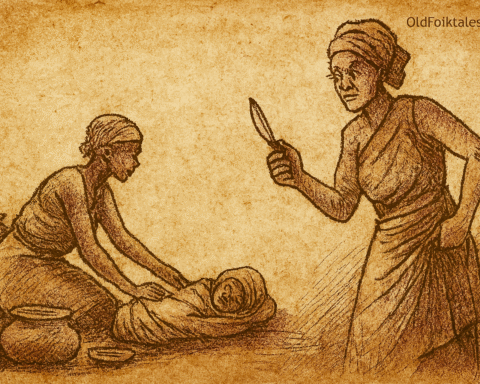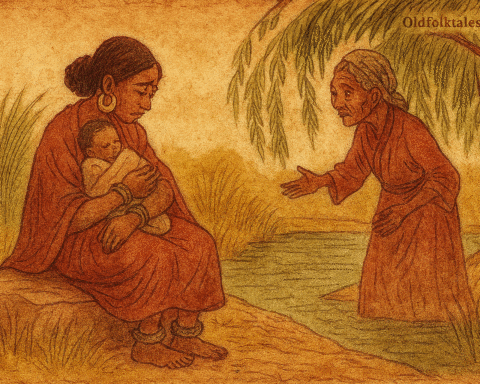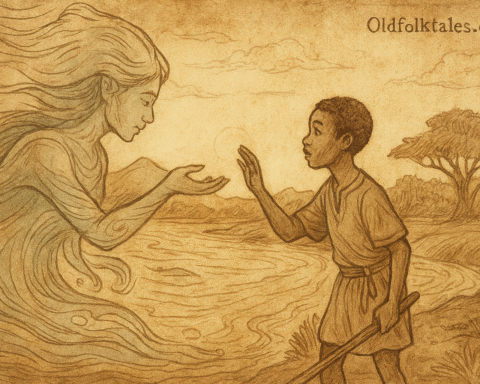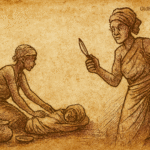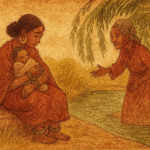There once lived a young spahi named Mandoye N’Gom, a soldier of the second class, who made his home in N’Dar Touti with his wife. One night, as he slept peacefully, the brightness of the moon deceived him. At two o’clock in the morning, its silvery light spilled into his room, so dazzling that Mandoye mistook it for the break of day. Believing he was late for his military duties, he shook his wife awake and demanded, “Get up and make my coffee.”
His wife, still heavy with sleep, turned and whispered, “Ah, Mandoye N’Gom, it is still too early. The night has not yet ended.”
But Mandoye, stubborn and impatient, snapped back, “That is none of your concern. Get up at once!”
When his wife refused to yield, Mandoye prepared the coffee himself. He drank it quickly, seized his riding whip, and stormed out of the house. “If I linger any longer, I will surely miss roll-call,” he muttered.
He sprinted through the dimly lit streets until he reached the civil prison, where his pace slowed to a steady walk. Reaching into his pouch, he stuffed tobacco into his pipe, savouring the bitter flavour as he continued toward the N’Dar Mosque.
READ: The Lion, the Jinn, and the Waxambaané | A Gambian Folktale
It was there, just beyond the mosque, that the night took a strange and dreadful turn. Out of the shadows rose a figure, a young woman, unclothed, her body glistening in the moonlight save for the waist beads she wore. She stood firmly in his path, blocking his way.
“My friend,” she said softly, “give me a piece of tobacco.”
Mandoye, startled, replied quickly, “I have no time. I would give it gladly, but I am rushing to roll-call. If I delay, I will be punished.”
But the woman would not let him pass. “You will not go forward,” she insisted, her tone sharp and strange. “I need that piece of tobacco.” Her eyes gleamed mischievously as she reached out, trying to embrace him, her arms stretching toward his shoulders.
Mandoye recoiled in shock. “What madness is this? The dawn has barely broken, and here is a woman asking for tobacco, behaving as if drunk with mischief!”
When she persisted, Mandoye’s soldierly temper flared. He raised his whip and struck her across the face. At once she cried out, not like a woman, but with a piercing wail that echoed through the night: “Hou…ou!” The sound rolled like the siren of a ship, chilling Mandoye to the bone. In an instant she fled into the darkness.
“Ah,” Mandoye gasped, trembling, “that was no woman. Surely, she was a jinn.”
Still shaken, he pressed onward until he reached the parade ground at the barracks. But as he stood there, the terror of what he had seen overwhelmed him. He too began to wail uncontrollably: “Hou…ou!” His cries rang out, startling his fellow soldiers.
The duty N.C.O. rushed to him, scolding angrily: “Mandoye, are you mad? At this hour, two o’clock in the morning, you cry like a jackal in the barracks? Tomorrow you will spend four days in the lock-up. Count on it!”
But Mandoye could no longer form words. His mind had broken beneath the weight of his encounter. The N.C.O. and the corporal of the week seized him and forced him upstairs. Though Mandoye tried to explain that he had seen something beyond the ordinary, his voice faltered, and he was laid down while another soldier remained to watch over him.
By morning, Mandoye’s condition worsened. He was taken to the hospital, where he remained for eight days. During this time, he could neither speak clearly nor find peace. His wife, deeply worried, visited him daily. Hidden beneath her dress, she carried charms and traditional medicines prepared by marabouts. Secretly, she slipped them to him, believing that only such remedies could undo the spell that had ensnared her husband.
Under this quiet care, Mandoye gradually began to recover. The doctors examined him, checked his pulse, and declared that he was improving, though they could not identify the cause of his illness. To them, it was a mystery beyond science.
But the marabouts, wise in spiritual matters, spoke plainly: “It was a jinn who caused this.”
Moral Lesson
This folktale reminds us that not all encounters in life are as they seem. Mandoye’s mistake was to act in haste, guided by pride and impatience. His refusal to heed his wife’s caution and his harsh reaction to the mysterious woman left him vulnerable to forces beyond his understanding. The story teaches humility, patience, and respect for the unseen world. In Gambian tradition, the spirit realm exists alongside the human one, and wisdom lies in recognizing its presence with caution rather than arrogance.
Knowledge Check
Q1: Who was Mandoye N’Gom in the story?
Mandoye N’Gom was a second-class spahi (soldier) living in N’Dar Touti with his wife.
Q2: What tricked Mandoye into leaving his home early?
The brightness of the moon made him think it was dawn.
Q3: Who blocked Mandoye’s path near the mosque?
A mysterious young woman wearing only waist beads, later revealed to be a jinn.
Q4: What sound did the jinn make after being struck?
She cried out “Hou…ou,” like the wail of a ship’s siren.
Q5: How was Mandoye eventually healed?
His wife secretly brought him charms and native medicines from marabouts while he was in the hospital.
Q6: What is the central lesson of this Gambian folktale?
The tale warns against arrogance, impatience, and dismissing the power of the unseen spiritual world.
Source: Gambian folktale, The Gambia.


